Scientific Management Theory, Tesco Application, and Analysis Report
VerifiedAdded on 2023/06/08
|10
|1905
|165
Report
AI Summary
This report provides an in-depth analysis of Frederick Winslow Taylor's scientific management theory, exploring its core principles and historical context. The report begins with an overview of Taylor's life and career, highlighting his contributions to the field of management, including his time-motion studies and emphasis on efficiency. It then delves into the four key principles of scientific management: developing a science for every part of a worker's job, scientifically selecting and training workers, fostering cooperation between management and workers, and dividing work and responsibility equally. The report then examines how Tesco, a major retail company, applies these principles in its operations, focusing on standardization, specialization, training and development, and the division of labor. Through this case study, the report illustrates the practical relevance of Taylor's theories in a modern business environment, demonstrating how these principles contribute to increased productivity and efficiency. The report concludes by summarizing the key findings and reiterating the enduring impact of scientific management on business practices.
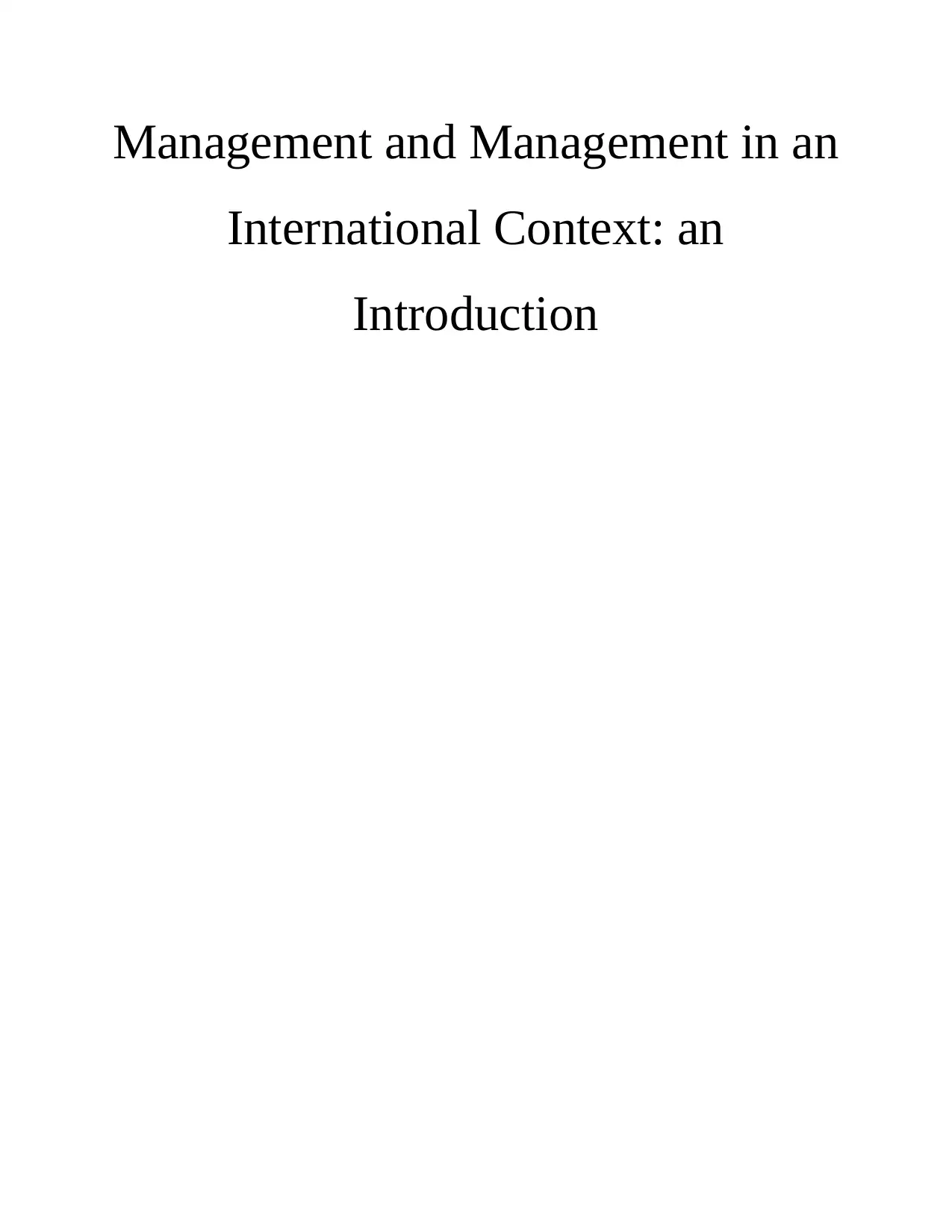
Management and Management in an
International Context: an
Introduction
International Context: an
Introduction
Paraphrase This Document
Need a fresh take? Get an instant paraphrase of this document with our AI Paraphraser
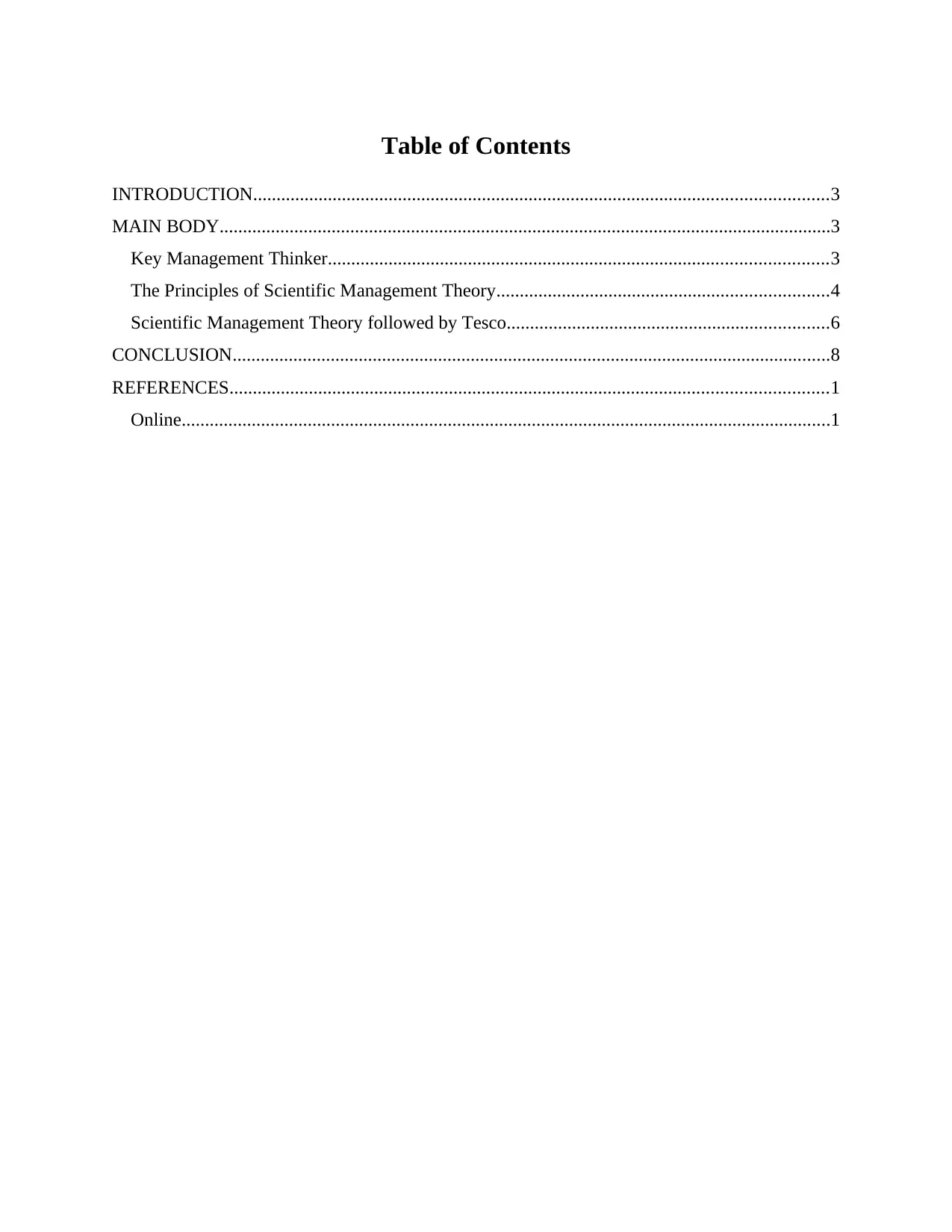
Table of Contents
INTRODUCTION...........................................................................................................................3
MAIN BODY...................................................................................................................................3
Key Management Thinker...........................................................................................................3
The Principles of Scientific Management Theory.......................................................................4
Scientific Management Theory followed by Tesco.....................................................................6
CONCLUSION................................................................................................................................8
REFERENCES................................................................................................................................1
Online...........................................................................................................................................1
INTRODUCTION...........................................................................................................................3
MAIN BODY...................................................................................................................................3
Key Management Thinker...........................................................................................................3
The Principles of Scientific Management Theory.......................................................................4
Scientific Management Theory followed by Tesco.....................................................................6
CONCLUSION................................................................................................................................8
REFERENCES................................................................................................................................1
Online...........................................................................................................................................1
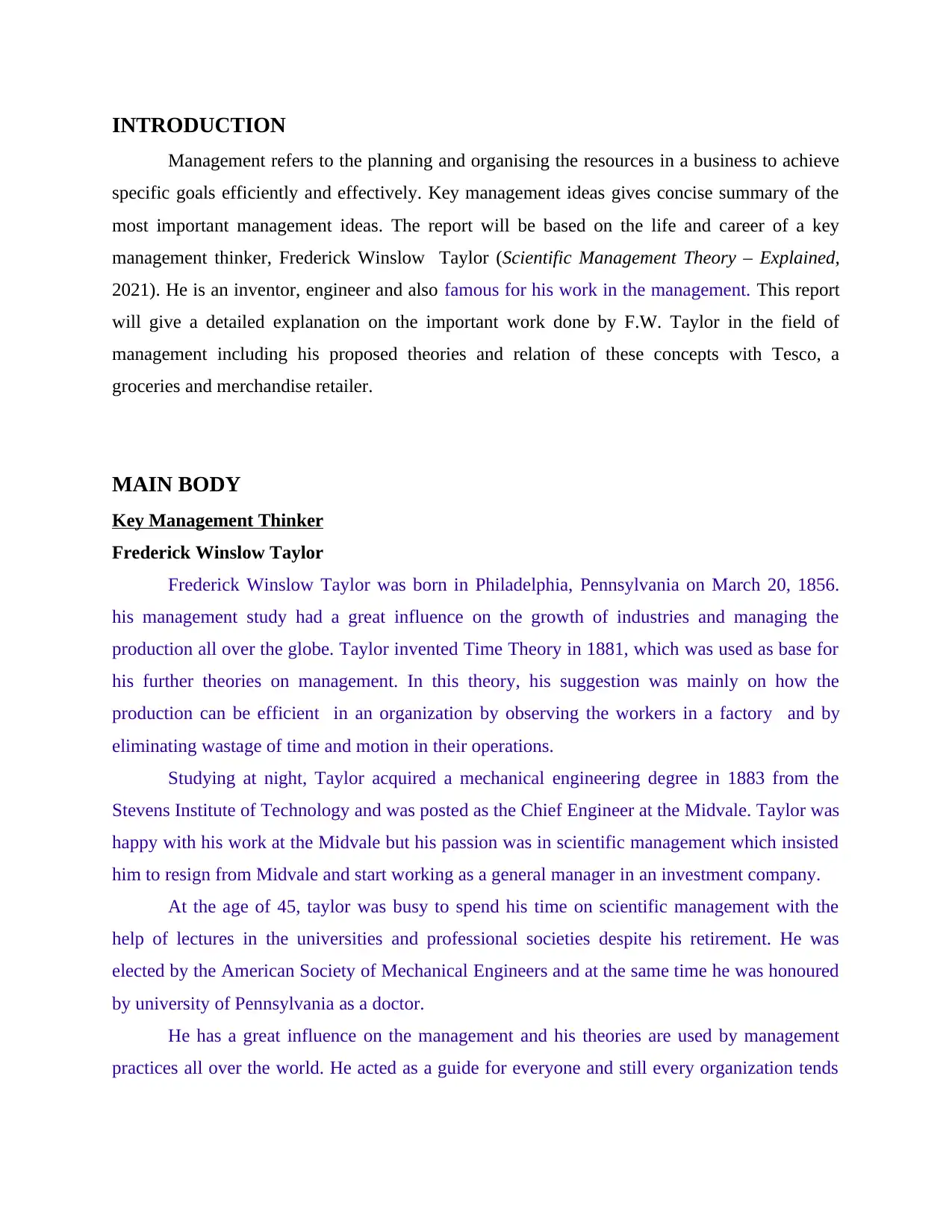
INTRODUCTION
Management refers to the planning and organising the resources in a business to achieve
specific goals efficiently and effectively. Key management ideas gives concise summary of the
most important management ideas. The report will be based on the life and career of a key
management thinker, Frederick Winslow Taylor (Scientific Management Theory – Explained,
2021). He is an inventor, engineer and also famous for his work in the management. This report
will give a detailed explanation on the important work done by F.W. Taylor in the field of
management including his proposed theories and relation of these concepts with Tesco, a
groceries and merchandise retailer.
MAIN BODY
Key Management Thinker
Frederick Winslow Taylor
Frederick Winslow Taylor was born in Philadelphia, Pennsylvania on March 20, 1856.
his management study had a great influence on the growth of industries and managing the
production all over the globe. Taylor invented Time Theory in 1881, which was used as base for
his further theories on management. In this theory, his suggestion was mainly on how the
production can be efficient in an organization by observing the workers in a factory and by
eliminating wastage of time and motion in their operations.
Studying at night, Taylor acquired a mechanical engineering degree in 1883 from the
Stevens Institute of Technology and was posted as the Chief Engineer at the Midvale. Taylor was
happy with his work at the Midvale but his passion was in scientific management which insisted
him to resign from Midvale and start working as a general manager in an investment company.
At the age of 45, taylor was busy to spend his time on scientific management with the
help of lectures in the universities and professional societies despite his retirement. He was
elected by the American Society of Mechanical Engineers and at the same time he was honoured
by university of Pennsylvania as a doctor.
He has a great influence on the management and his theories are used by management
practices all over the world. He acted as a guide for everyone and still every organization tends
Management refers to the planning and organising the resources in a business to achieve
specific goals efficiently and effectively. Key management ideas gives concise summary of the
most important management ideas. The report will be based on the life and career of a key
management thinker, Frederick Winslow Taylor (Scientific Management Theory – Explained,
2021). He is an inventor, engineer and also famous for his work in the management. This report
will give a detailed explanation on the important work done by F.W. Taylor in the field of
management including his proposed theories and relation of these concepts with Tesco, a
groceries and merchandise retailer.
MAIN BODY
Key Management Thinker
Frederick Winslow Taylor
Frederick Winslow Taylor was born in Philadelphia, Pennsylvania on March 20, 1856.
his management study had a great influence on the growth of industries and managing the
production all over the globe. Taylor invented Time Theory in 1881, which was used as base for
his further theories on management. In this theory, his suggestion was mainly on how the
production can be efficient in an organization by observing the workers in a factory and by
eliminating wastage of time and motion in their operations.
Studying at night, Taylor acquired a mechanical engineering degree in 1883 from the
Stevens Institute of Technology and was posted as the Chief Engineer at the Midvale. Taylor was
happy with his work at the Midvale but his passion was in scientific management which insisted
him to resign from Midvale and start working as a general manager in an investment company.
At the age of 45, taylor was busy to spend his time on scientific management with the
help of lectures in the universities and professional societies despite his retirement. He was
elected by the American Society of Mechanical Engineers and at the same time he was honoured
by university of Pennsylvania as a doctor.
He has a great influence on the management and his theories are used by management
practices all over the world. He acted as a guide for everyone and still every organization tends
⊘ This is a preview!⊘
Do you want full access?
Subscribe today to unlock all pages.

Trusted by 1+ million students worldwide
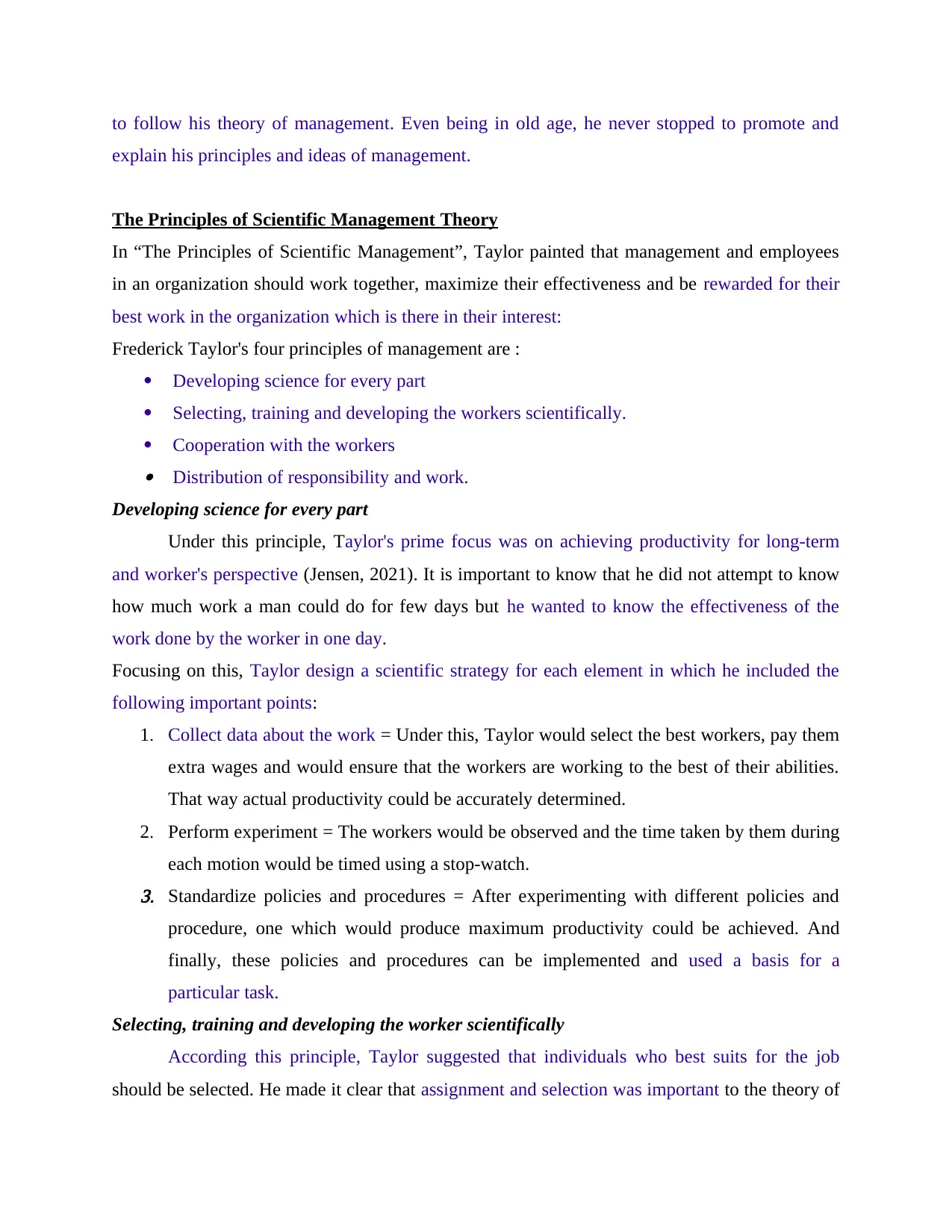
to follow his theory of management. Even being in old age, he never stopped to promote and
explain his principles and ideas of management.
The Principles of Scientific Management Theory
In “The Principles of Scientific Management”, Taylor painted that management and employees
in an organization should work together, maximize their effectiveness and be rewarded for their
best work in the organization which is there in their interest:
Frederick Taylor's four principles of management are :
Developing science for every part
Selecting, training and developing the workers scientifically.
Cooperation with the workers Distribution of responsibility and work.
Developing science for every part
Under this principle, Taylor's prime focus was on achieving productivity for long-term
and worker's perspective (Jensen, 2021). It is important to know that he did not attempt to know
how much work a man could do for few days but he wanted to know the effectiveness of the
work done by the worker in one day.
Focusing on this, Taylor design a scientific strategy for each element in which he included the
following important points:
1. Collect data about the work = Under this, Taylor would select the best workers, pay them
extra wages and would ensure that the workers are working to the best of their abilities.
That way actual productivity could be accurately determined.
2. Perform experiment = The workers would be observed and the time taken by them during
each motion would be timed using a stop-watch.3. Standardize policies and procedures = After experimenting with different policies and
procedure, one which would produce maximum productivity could be achieved. And
finally, these policies and procedures can be implemented and used a basis for a
particular task.
Selecting, training and developing the worker scientifically
According this principle, Taylor suggested that individuals who best suits for the job
should be selected. He made it clear that assignment and selection was important to the theory of
explain his principles and ideas of management.
The Principles of Scientific Management Theory
In “The Principles of Scientific Management”, Taylor painted that management and employees
in an organization should work together, maximize their effectiveness and be rewarded for their
best work in the organization which is there in their interest:
Frederick Taylor's four principles of management are :
Developing science for every part
Selecting, training and developing the workers scientifically.
Cooperation with the workers Distribution of responsibility and work.
Developing science for every part
Under this principle, Taylor's prime focus was on achieving productivity for long-term
and worker's perspective (Jensen, 2021). It is important to know that he did not attempt to know
how much work a man could do for few days but he wanted to know the effectiveness of the
work done by the worker in one day.
Focusing on this, Taylor design a scientific strategy for each element in which he included the
following important points:
1. Collect data about the work = Under this, Taylor would select the best workers, pay them
extra wages and would ensure that the workers are working to the best of their abilities.
That way actual productivity could be accurately determined.
2. Perform experiment = The workers would be observed and the time taken by them during
each motion would be timed using a stop-watch.3. Standardize policies and procedures = After experimenting with different policies and
procedure, one which would produce maximum productivity could be achieved. And
finally, these policies and procedures can be implemented and used a basis for a
particular task.
Selecting, training and developing the worker scientifically
According this principle, Taylor suggested that individuals who best suits for the job
should be selected. He made it clear that assignment and selection was important to the theory of
Paraphrase This Document
Need a fresh take? Get an instant paraphrase of this document with our AI Paraphraser
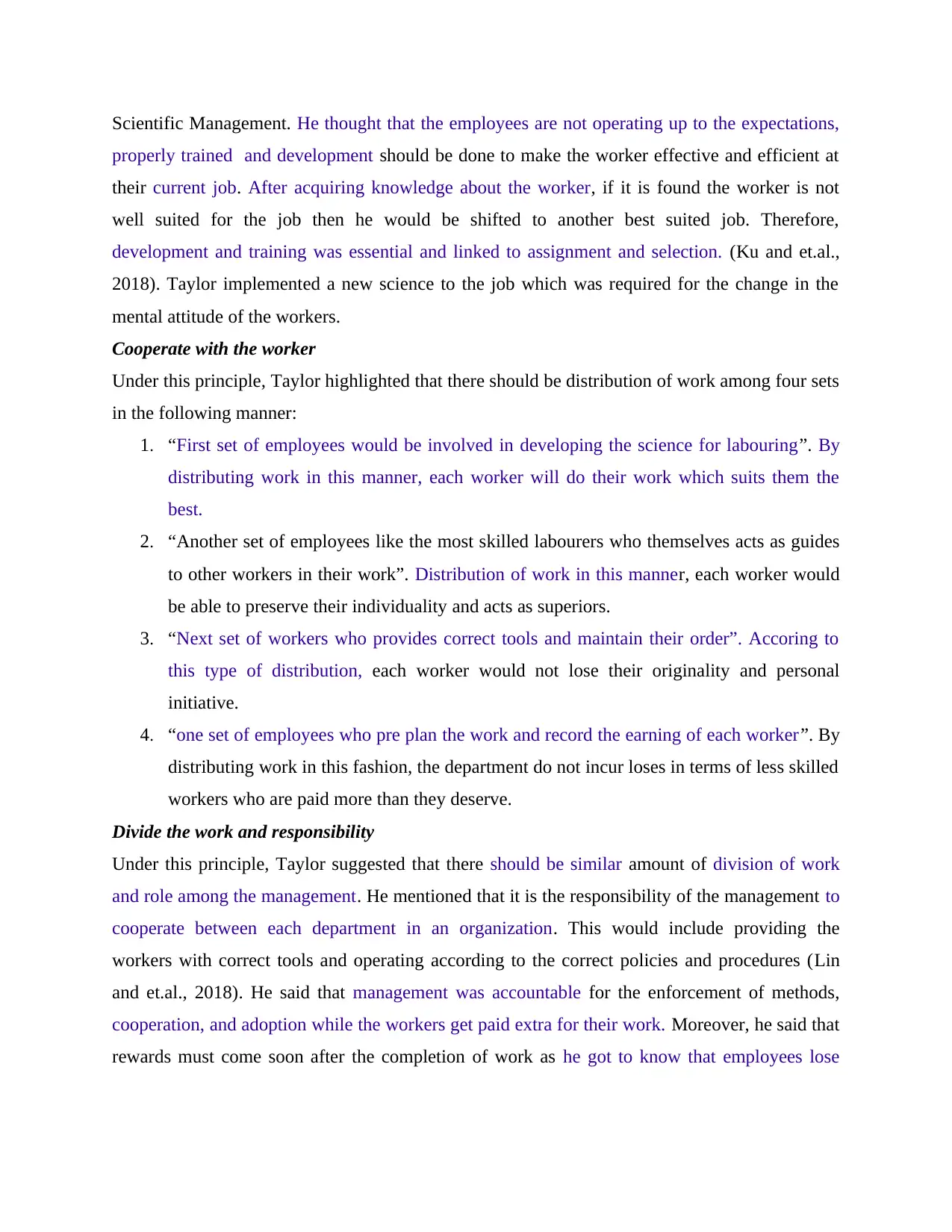
Scientific Management. He thought that the employees are not operating up to the expectations,
properly trained and development should be done to make the worker effective and efficient at
their current job. After acquiring knowledge about the worker, if it is found the worker is not
well suited for the job then he would be shifted to another best suited job. Therefore,
development and training was essential and linked to assignment and selection. (Ku and et.al.,
2018). Taylor implemented a new science to the job which was required for the change in the
mental attitude of the workers.
Cooperate with the worker
Under this principle, Taylor highlighted that there should be distribution of work among four sets
in the following manner:
1. “First set of employees would be involved in developing the science for labouring”. By
distributing work in this manner, each worker will do their work which suits them the
best.
2. “Another set of employees like the most skilled labourers who themselves acts as guides
to other workers in their work”. Distribution of work in this manner, each worker would
be able to preserve their individuality and acts as superiors.
3. “Next set of workers who provides correct tools and maintain their order”. Accoring to
this type of distribution, each worker would not lose their originality and personal
initiative.
4. “one set of employees who pre plan the work and record the earning of each worker”. By
distributing work in this fashion, the department do not incur loses in terms of less skilled
workers who are paid more than they deserve.
Divide the work and responsibility
Under this principle, Taylor suggested that there should be similar amount of division of work
and role among the management. He mentioned that it is the responsibility of the management to
cooperate between each department in an organization. This would include providing the
workers with correct tools and operating according to the correct policies and procedures (Lin
and et.al., 2018). He said that management was accountable for the enforcement of methods,
cooperation, and adoption while the workers get paid extra for their work. Moreover, he said that
rewards must come soon after the completion of work as he got to know that employees lose
properly trained and development should be done to make the worker effective and efficient at
their current job. After acquiring knowledge about the worker, if it is found the worker is not
well suited for the job then he would be shifted to another best suited job. Therefore,
development and training was essential and linked to assignment and selection. (Ku and et.al.,
2018). Taylor implemented a new science to the job which was required for the change in the
mental attitude of the workers.
Cooperate with the worker
Under this principle, Taylor highlighted that there should be distribution of work among four sets
in the following manner:
1. “First set of employees would be involved in developing the science for labouring”. By
distributing work in this manner, each worker will do their work which suits them the
best.
2. “Another set of employees like the most skilled labourers who themselves acts as guides
to other workers in their work”. Distribution of work in this manner, each worker would
be able to preserve their individuality and acts as superiors.
3. “Next set of workers who provides correct tools and maintain their order”. Accoring to
this type of distribution, each worker would not lose their originality and personal
initiative.
4. “one set of employees who pre plan the work and record the earning of each worker”. By
distributing work in this fashion, the department do not incur loses in terms of less skilled
workers who are paid more than they deserve.
Divide the work and responsibility
Under this principle, Taylor suggested that there should be similar amount of division of work
and role among the management. He mentioned that it is the responsibility of the management to
cooperate between each department in an organization. This would include providing the
workers with correct tools and operating according to the correct policies and procedures (Lin
and et.al., 2018). He said that management was accountable for the enforcement of methods,
cooperation, and adoption while the workers get paid extra for their work. Moreover, he said that
rewards must come soon after the completion of work as he got to know that employees lose
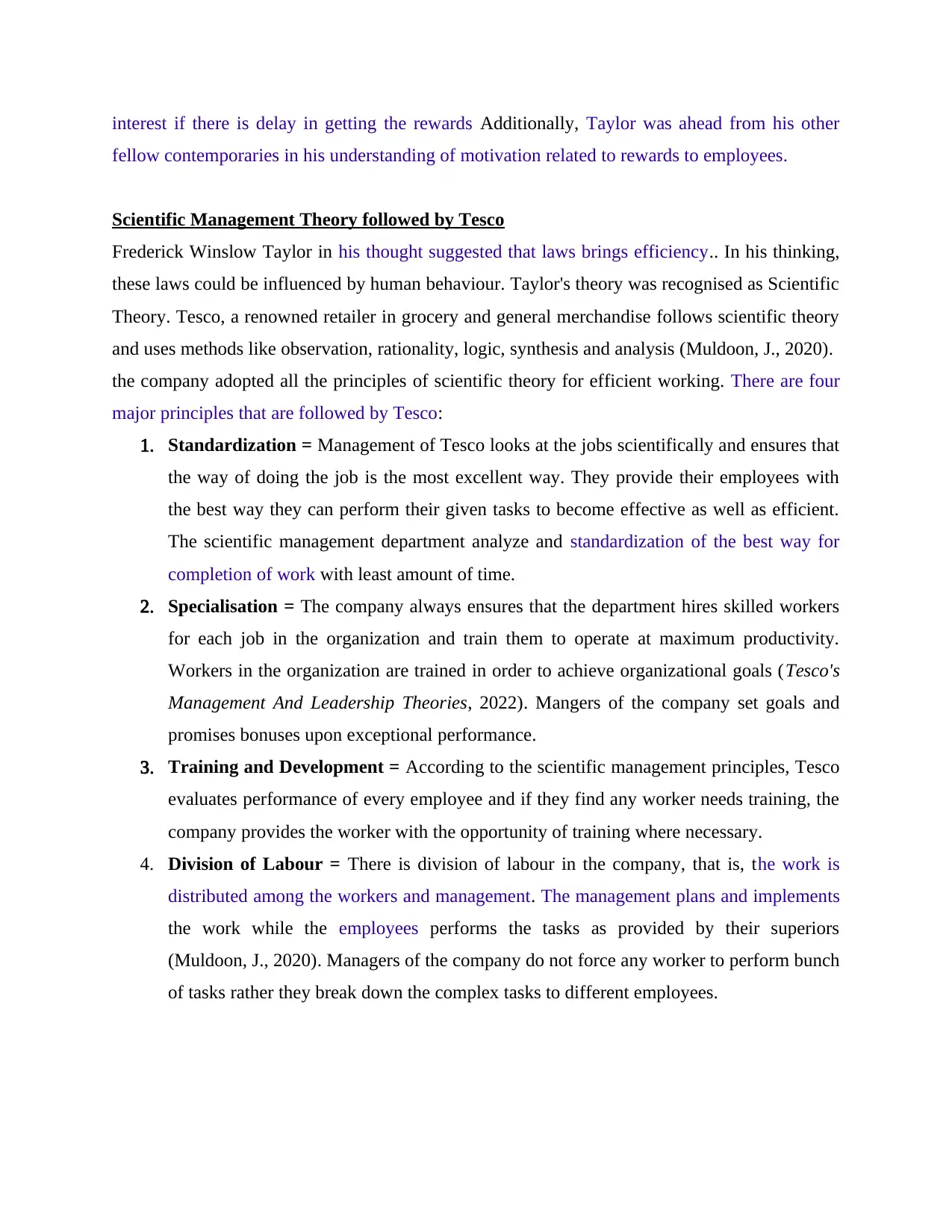
interest if there is delay in getting the rewards Additionally, Taylor was ahead from his other
fellow contemporaries in his understanding of motivation related to rewards to employees.
Scientific Management Theory followed by Tesco
Frederick Winslow Taylor in his thought suggested that laws brings efficiency.. In his thinking,
these laws could be influenced by human behaviour. Taylor's theory was recognised as Scientific
Theory. Tesco, a renowned retailer in grocery and general merchandise follows scientific theory
and uses methods like observation, rationality, logic, synthesis and analysis (Muldoon, J., 2020).
the company adopted all the principles of scientific theory for efficient working. There are four
major principles that are followed by Tesco:
1. Standardization = Management of Tesco looks at the jobs scientifically and ensures that
the way of doing the job is the most excellent way. They provide their employees with
the best way they can perform their given tasks to become effective as well as efficient.
The scientific management department analyze and standardization of the best way for
completion of work with least amount of time.
2. Specialisation = The company always ensures that the department hires skilled workers
for each job in the organization and train them to operate at maximum productivity.
Workers in the organization are trained in order to achieve organizational goals (Tesco's
Management And Leadership Theories, 2022). Mangers of the company set goals and
promises bonuses upon exceptional performance.
3. Training and Development = According to the scientific management principles, Tesco
evaluates performance of every employee and if they find any worker needs training, the
company provides the worker with the opportunity of training where necessary.
4. Division of Labour = There is division of labour in the company, that is, the work is
distributed among the workers and management. The management plans and implements
the work while the employees performs the tasks as provided by their superiors
(Muldoon, J., 2020). Managers of the company do not force any worker to perform bunch
of tasks rather they break down the complex tasks to different employees.
fellow contemporaries in his understanding of motivation related to rewards to employees.
Scientific Management Theory followed by Tesco
Frederick Winslow Taylor in his thought suggested that laws brings efficiency.. In his thinking,
these laws could be influenced by human behaviour. Taylor's theory was recognised as Scientific
Theory. Tesco, a renowned retailer in grocery and general merchandise follows scientific theory
and uses methods like observation, rationality, logic, synthesis and analysis (Muldoon, J., 2020).
the company adopted all the principles of scientific theory for efficient working. There are four
major principles that are followed by Tesco:
1. Standardization = Management of Tesco looks at the jobs scientifically and ensures that
the way of doing the job is the most excellent way. They provide their employees with
the best way they can perform their given tasks to become effective as well as efficient.
The scientific management department analyze and standardization of the best way for
completion of work with least amount of time.
2. Specialisation = The company always ensures that the department hires skilled workers
for each job in the organization and train them to operate at maximum productivity.
Workers in the organization are trained in order to achieve organizational goals (Tesco's
Management And Leadership Theories, 2022). Mangers of the company set goals and
promises bonuses upon exceptional performance.
3. Training and Development = According to the scientific management principles, Tesco
evaluates performance of every employee and if they find any worker needs training, the
company provides the worker with the opportunity of training where necessary.
4. Division of Labour = There is division of labour in the company, that is, the work is
distributed among the workers and management. The management plans and implements
the work while the employees performs the tasks as provided by their superiors
(Muldoon, J., 2020). Managers of the company do not force any worker to perform bunch
of tasks rather they break down the complex tasks to different employees.
⊘ This is a preview!⊘
Do you want full access?
Subscribe today to unlock all pages.

Trusted by 1+ million students worldwide
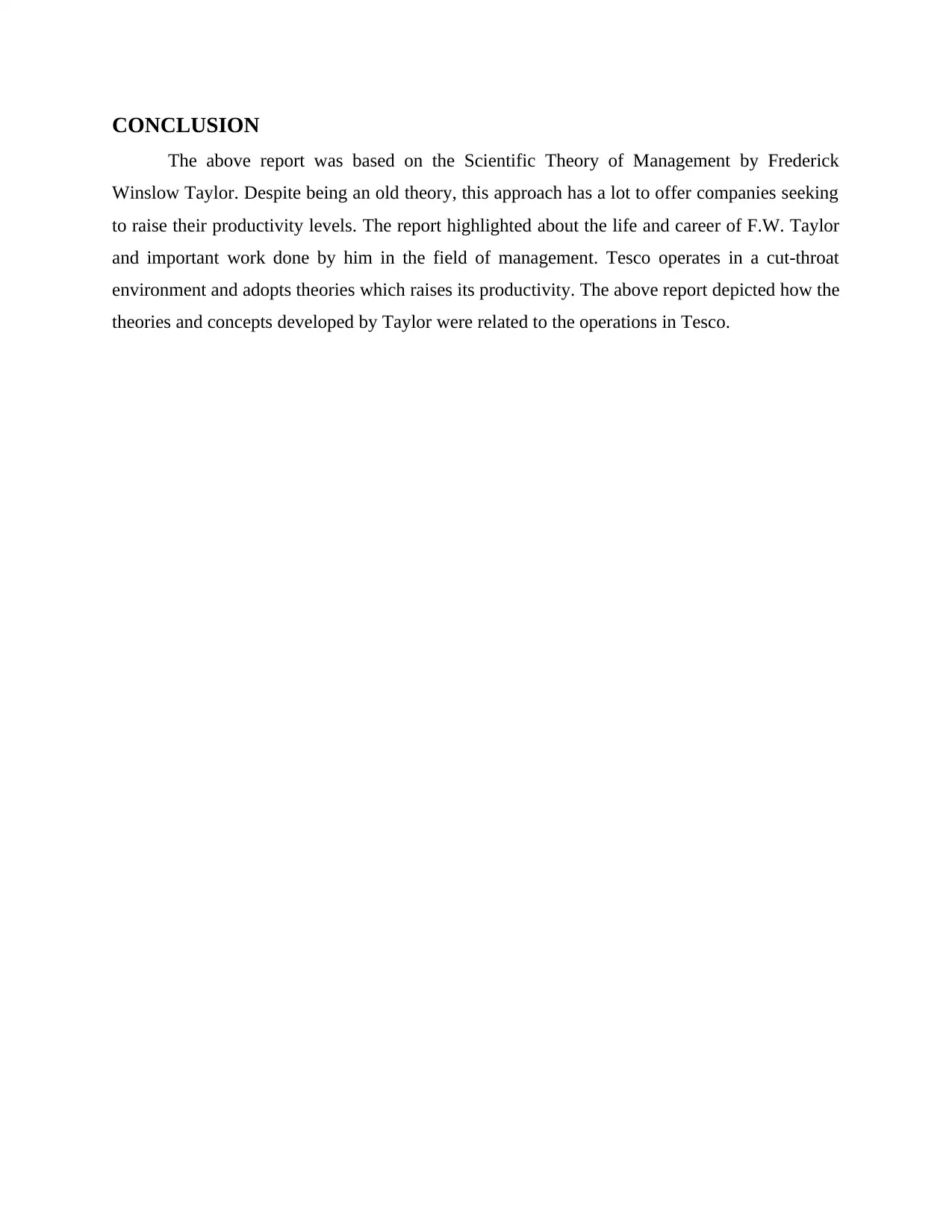
CONCLUSION
The above report was based on the Scientific Theory of Management by Frederick
Winslow Taylor. Despite being an old theory, this approach has a lot to offer companies seeking
to raise their productivity levels. The report highlighted about the life and career of F.W. Taylor
and important work done by him in the field of management. Tesco operates in a cut-throat
environment and adopts theories which raises its productivity. The above report depicted how the
theories and concepts developed by Taylor were related to the operations in Tesco.
The above report was based on the Scientific Theory of Management by Frederick
Winslow Taylor. Despite being an old theory, this approach has a lot to offer companies seeking
to raise their productivity levels. The report highlighted about the life and career of F.W. Taylor
and important work done by him in the field of management. Tesco operates in a cut-throat
environment and adopts theories which raises its productivity. The above report depicted how the
theories and concepts developed by Taylor were related to the operations in Tesco.
Paraphrase This Document
Need a fresh take? Get an instant paraphrase of this document with our AI Paraphraser
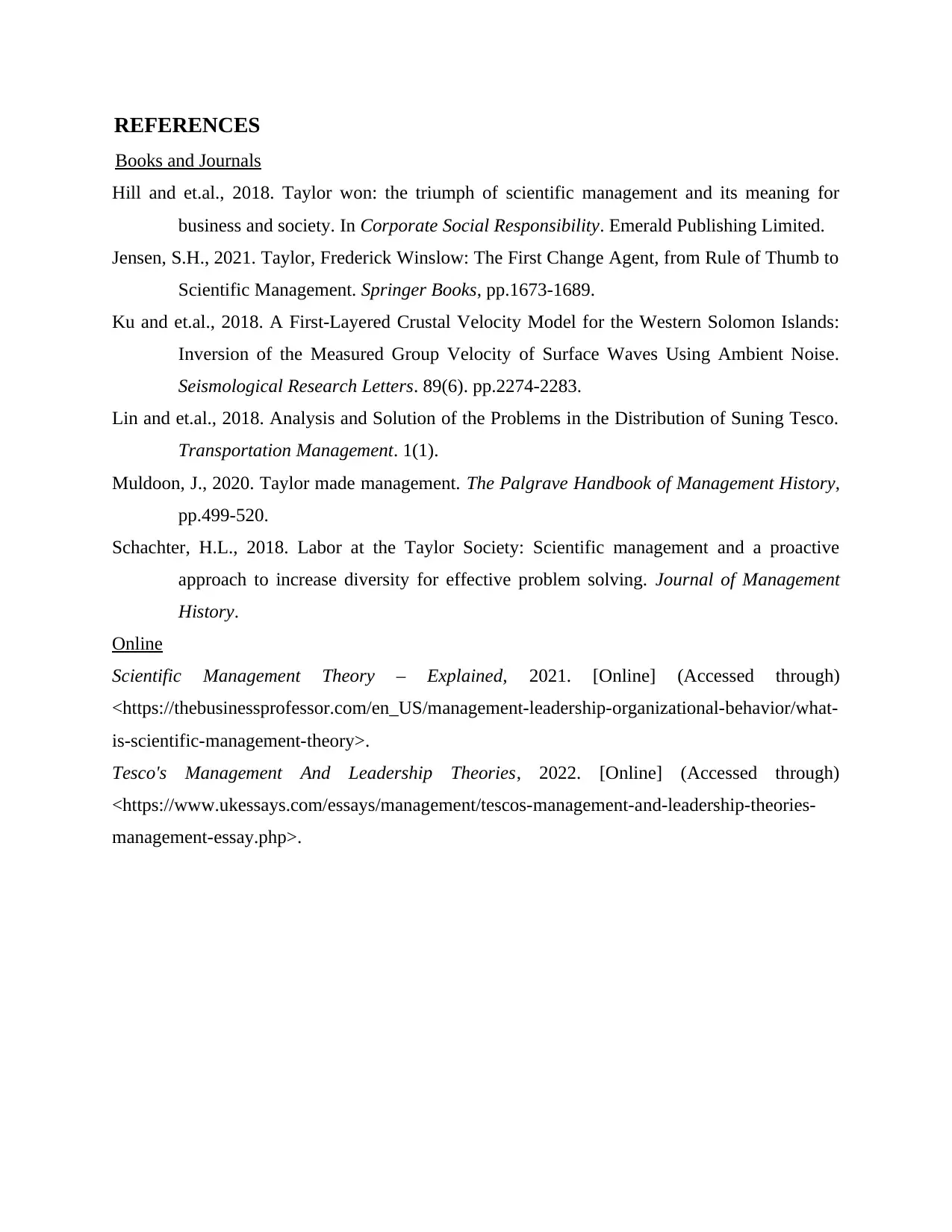
REFERENCES
Books and Journals
Hill and et.al., 2018. Taylor won: the triumph of scientific management and its meaning for
business and society. In Corporate Social Responsibility. Emerald Publishing Limited.
Jensen, S.H., 2021. Taylor, Frederick Winslow: The First Change Agent, from Rule of Thumb to
Scientific Management. Springer Books, pp.1673-1689.
Ku and et.al., 2018. A First‐Layered Crustal Velocity Model for the Western Solomon Islands:
Inversion of the Measured Group Velocity of Surface Waves Using Ambient Noise.
Seismological Research Letters. 89(6). pp.2274-2283.
Lin and et.al., 2018. Analysis and Solution of the Problems in the Distribution of Suning Tesco.
Transportation Management. 1(1).
Muldoon, J., 2020. Taylor made management. The Palgrave Handbook of Management History,
pp.499-520.
Schachter, H.L., 2018. Labor at the Taylor Society: Scientific management and a proactive
approach to increase diversity for effective problem solving. Journal of Management
History.
Online
Scientific Management Theory – Explained, 2021. [Online] (Accessed through)
<https://thebusinessprofessor.com/en_US/management-leadership-organizational-behavior/what-
is-scientific-management-theory>.
Tesco's Management And Leadership Theories, 2022. [Online] (Accessed through)
<https://www.ukessays.com/essays/management/tescos-management-and-leadership-theories-
management-essay.php>.
Books and Journals
Hill and et.al., 2018. Taylor won: the triumph of scientific management and its meaning for
business and society. In Corporate Social Responsibility. Emerald Publishing Limited.
Jensen, S.H., 2021. Taylor, Frederick Winslow: The First Change Agent, from Rule of Thumb to
Scientific Management. Springer Books, pp.1673-1689.
Ku and et.al., 2018. A First‐Layered Crustal Velocity Model for the Western Solomon Islands:
Inversion of the Measured Group Velocity of Surface Waves Using Ambient Noise.
Seismological Research Letters. 89(6). pp.2274-2283.
Lin and et.al., 2018. Analysis and Solution of the Problems in the Distribution of Suning Tesco.
Transportation Management. 1(1).
Muldoon, J., 2020. Taylor made management. The Palgrave Handbook of Management History,
pp.499-520.
Schachter, H.L., 2018. Labor at the Taylor Society: Scientific management and a proactive
approach to increase diversity for effective problem solving. Journal of Management
History.
Online
Scientific Management Theory – Explained, 2021. [Online] (Accessed through)
<https://thebusinessprofessor.com/en_US/management-leadership-organizational-behavior/what-
is-scientific-management-theory>.
Tesco's Management And Leadership Theories, 2022. [Online] (Accessed through)
<https://www.ukessays.com/essays/management/tescos-management-and-leadership-theories-
management-essay.php>.

⊘ This is a preview!⊘
Do you want full access?
Subscribe today to unlock all pages.

Trusted by 1+ million students worldwide

3
1 out of 10
Related Documents
Your All-in-One AI-Powered Toolkit for Academic Success.
+13062052269
info@desklib.com
Available 24*7 on WhatsApp / Email
![[object Object]](/_next/static/media/star-bottom.7253800d.svg)
Unlock your academic potential
Copyright © 2020–2026 A2Z Services. All Rights Reserved. Developed and managed by ZUCOL.





